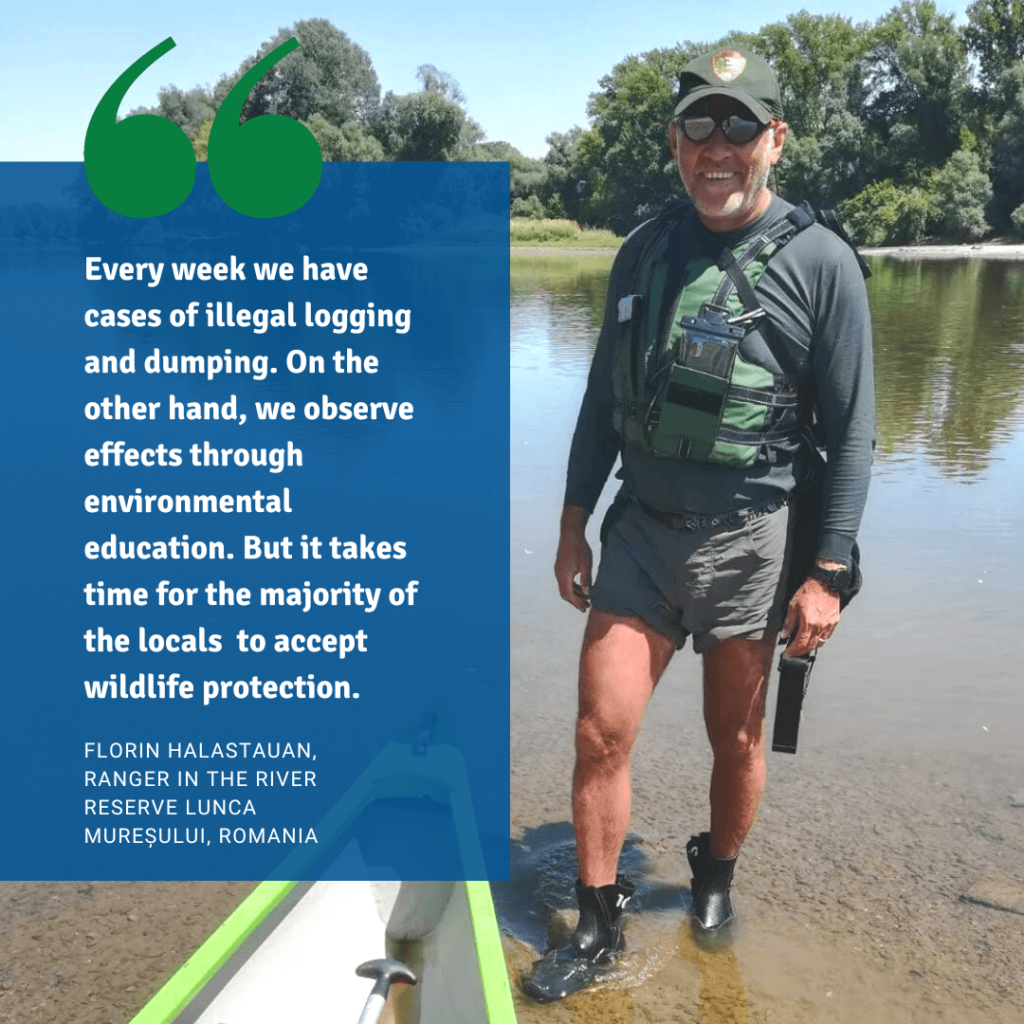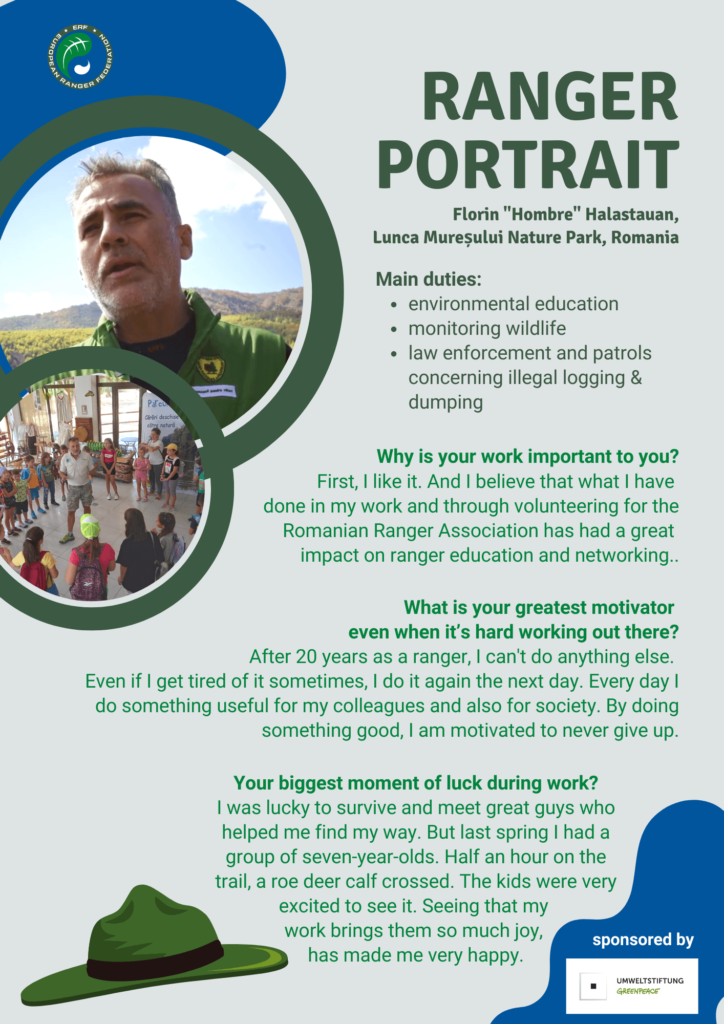Romania had its first national park as early as 1938: Retezat National Park in the southeast. One of the first rangers there and in Romania at all was Florin Halastauan, known to many in the ranger community as “Hombre”. We talked to Florin about how Romania’s rangers cope with the massive influx of visitors and illegal logging, which in Romania affects one in two trees felled, according to recent research by the Süddeutsche Zeitung as part of the international research group ICIJ.
Added to this, rangers’ duties of environmental education are constantly increasing. Adequate training is needed for all of this. Through his job and his role in the Romanian Ranger Association, Florin helped achieve that rangers in Romania have access to training and their profession is officially recognized today. As International Representative of the association, he promotes their networking nationally and internationally, for some years also as co-founder of the European Ranger Federation. Today he works as ranger in Lunca Mureșului, an 80 kilometers long Floodplain Nature Park located in western Romania just outside the city of Arad.

What are the issues rangers in Romania were dealing with recently?
It was a very difficult period. In the pandemic most of the rangers needed to patrol alone and had to adapt, doing their best. Now the authorities of the Ministry of Environment try to put a lot of focus on environmental education and nature’s benefits regarding climate change. We have more and more duties here. But monitoring still remains an important duty, as does law enforcement around the park with a lot of pressure from tourist activity and also the massive problem of illegal logging. Especially since the pandemics, when people traveled inside their country pushing to iconic sites in the protected areas, controlling the compliance of rules has become one of the biggest challenges for Romanian rangers. Ranger numbers are too low to encounter them properly. But we try to employ seasonal rangers or volunteers to help out with tourists, intensify patrols and cooperate with the forestry department regarding illegal logging.
Florin and his fellow rangers were involved in helping the people and colleagues in Ukraine during the first months of the Russian war of aggression on their neighboring country. Listen to how the support is going today and what the situation in the protected areas is like:
Does the government support you to provide environmental education?
They just set up some ideas and regulations. We need to put them into practice. Most of the protected areas in Romania are under the umbrella of the forestry department. It started a program to get all schools of the surrounding communities into lessons of environmental education. The park I work in is five kilometers from the next city. So all next week we have more than 150 children in different groups coming into the park. 3 to 4 of us will teach them in workshops, lessons, movies, on education trails and more about nature, how we protect it and the benefits of nature. This program runs all over the country, so most of the parks are very involved this week in environmental education.

How did you become a ranger? Is there regulated training and official recognition for the ranger profession?
I was one of the first full time rangers employed in Romania in 2004. Me and one other ranger were working in Retezat national park, the oldest in Romania, located in the southeast and established 1938. At that time, rangers were more or less hardly prepared. Over time other rangers were joining us, coming from forestry and now working in different parks. With the Romanian Ranger Association and its different training programs around Romania and also on an international base, step by step we started to complete our skills. Now there’s also a big group called Pro Park Foundation, which runs a company offering training with certificates for protected area workers: biologists, ecologists, rangers and other protected area specialists. Last year, the Romanian Ranger Association also succeeded in establishing a list of skills needed for the ranger job in the Romanian legislation: skills in Geography or Biology for instance, a curriculum for the training of rangers, provided by organisations like Pro Park. And the ranger job now is officially recognised as a profession.







How is the acceptance of nature conservation in Romania in general among residents and visitors of protected areas?
The experience from the older protected areas is that people get used after five to ten years, starting to collaborate and respect rules. Our park is still young, founded in 2014. Like most of Romania’s protected areas we have big issues with illegal logging for firewood, as the park borders a large city and several small communities, some of them home to very poor people. Another issue is trash dumping at the border of the park, even if there is waste management in the villages. Every week we have several cases regarding those issues, in some parts also with illegal grazing. It is like five percent of the local people who never will accept the rules. On the other hand, we observe effects through environmental education, especially on young people. But this is only from the last five years. It will take more time for the majority of locals to fully accept the protection of wildlife.
As one of the co-founders of the European Ranger Federation, Florin gives an assessment on the ERF’s work today and recommends to rangers in Europe to get involved in networking:
What can Europe’s rangers learn from their Romanian colleagues?
Each park has rangers with good skills for wildlife monitoring. We have more wild areas and thus more experience than most of Western Europe with managing its wildlife, interpreting wildlife tracks or places. And Romanian rangers need to adapt a lot, using many different skills in one job, which we apply strongly depending on the seasons. For example, me and my colleagues now do one week of environmental education, after that we do monitoring, repair trails, guide tourists and make patrols.
We met Florin in person at the fifth European Ranger Congress. See what he tells about his work, his role in the Romanian Ranger Association and as former part of the board of the European Ranger Federation:
editorial work for this
content is supported by


